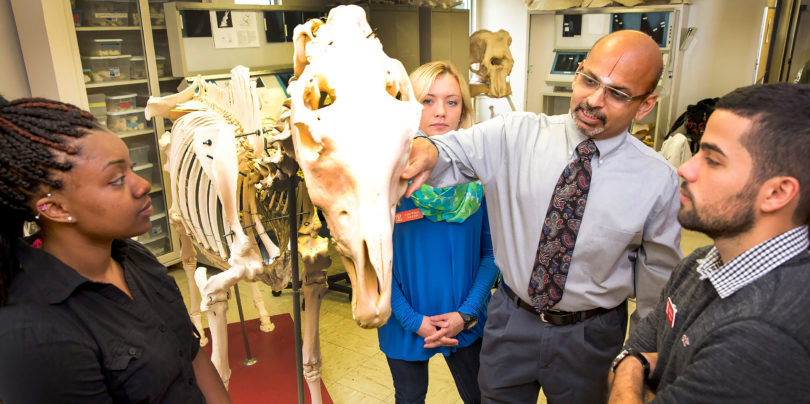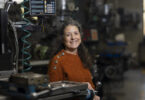Puliyur S. MohanKumar, a professor in the College of Veterinary Medicine, has forged research collaborations related to stem cells, nanoparticles and imaging with the goal of improving human and animal health.
Where did you earn degrees and what are your current responsibilities at UGA?
I received my Doctor of Veterinary Medicine degree from Madras Veterinary College in India. Following that I received my Ph.D. in neuroendocrinology at the Kansas State University College of Veterinary Medicine. I currently teach veterinary anatomy to D.V.M. students at UGA and pursue neuroendocrinology research.
When did you come to UGA and what brought you here?
I came to UGA in June 2015. The outstanding chair of the department, great weather, people and town brought me and my wife, associate professor Sheba MohanKumar, here. Further, there were several opportunities for us to forge new collaborations all over the campus.
What are your favorite courses and why?
I enjoy teaching “Veterinary Anatomy” and believe it makes a huge difference in the knowledge base of future veterinarians.
What interests you about your field?
The excitement and opportunities it presents to discover and pursue innovative ideas.
What are some highlights of your career at UGA?
Forging new collaborations in the area of stem cells, nanoparticles and imaging. I also was honored to receive the Faculty Recognition Award presented by the College of Veterinary Medicine’s Class of 2016 in the first year of our arrival.
How does your research or scholarship inspire your teaching, and vice versa?
I believe that being a successful researcher requires that you be a good teacher. Unless you can explain things clearly to the reviewers of grant proposals (which is nothing but teaching), you will not be able to get your grants funded, which is essential for being successful in research. When you pursue research, you have an in-depth understanding of the subject matter, which is very critical for teaching complex ideas to students. Thus, they go together.
What do you hope students gain from their classroom experience with you?
I wish that they learn without a lot of stress, which will help them retain the information for a long time and apply it when they practice veterinary medicine.
Describe your ideal student.
Interested and inquisitive about learning and applying the knowledge he/she has learned; respectful and caring and conscious about society, community and country.
Favorite place to be/thing to do on campus is…
… to go to Tate Center and have a cup of coffee with my daughter, who is a sophomore here at UGA, and my wife.
Beyond the UGA campus, I like to…
… try different unique restaurants here in Athens with my family. I also like to cook and listen to Indian Classical music. I play a South Indian finger drum called Mridangam and a clay pot called Ghatam. I continue to learn from a legendary percussion maestro professor Trichy Sankaran at York University in Toronto.
Community/civic involvement includes….
I would like to promote Indian classical music and hopefully, organize some Indian music concerts.
Favorite book/movie (and why)?
My favorite books are “Roots” by Alex Haley, “Long Walk to Freedom” by Nelson Mandela, “The Story of My Experiments with Truth” by Gandhi, “An Autobiography of a Yogi” by Paramahamsa Yogananda and “The Power of Now” by Eckhart Tolle—all for the inspiration they give.
Proudest moment at UGA?
Pulling together a group of interested interdisciplinary researchers to form Georgia Research Opportunities in Women’s Health (GROWH). The aim of the program is to promote women’s health research at UGA and provide a strong foundation in research training in the area of women’s health for talented young scientists and help them engage with local communities for a lasting positive impact.








